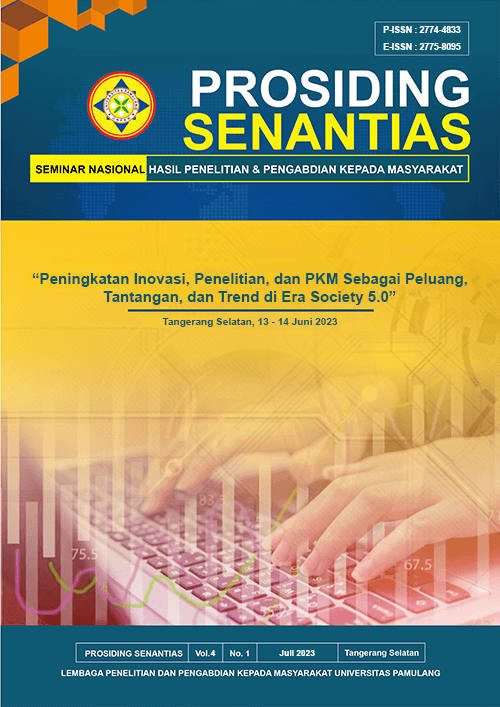PENGARUH SUMBER DAYA KERJA TERHADAP TOTALITAS KERJA DAN SPIRITUALITAS KERJA SEBAGAI MEDIATOR
Keywords:
sumber daya kerja, spiritualitas kerja, dan totalitas kerjaAbstract
Studi tentang totalitas kerja memberikan keefektivitas kerja dan ketidaktergantungan yang dari waktu ke waktu dipengaruhi oleh sumber daya kerja. Kemampuan mengelola sumber daya kerja mengubah tuntutan menjadi tantangan kerja. Namun, tren digital merubah cara kerja seseorang sebagaimana prediksi Wrike yang merupakan sebuah perusahaan pembuat perangkat lunak project management, menyebutkan bahwa selain peningkatan produktivitas kerja sementara pemanfaatan teknologi pun akan menghilangkan batasan antara kehidupan pribadi dan pekerjaan. Sehingga keinginan individu tertentu yang ingin menemukan makna hidup terabaikan. Kehilangan makna dalam hidup, termasuk makna bekerja oleh sebab tidak memiliki spiritualitas kerja. Penelitian ini bertujuan untuk mengetahui apakah totalitas kerja pada individu dapat dipengaruhi oleh sumber daya kerja melalui mediator spiritualitas kerja. Metode yang digunakan dalam penelitian ini adalah Structural Equation Modeling untuk mengetahui pengaruh langsung dan tidak langsung variabel eksogen terhadap totalitas kerja. Validitas alat ukur dalam penelitian ini dengan Confirmatory Factor Analysis (CFA). Metode sampling yang digunakan dalam penelitian ini adalah non-probability sampling (accidental sampling) dengan melibatkan 220 responden individu yang bekerja di dalam organisasi pelayanan publik. Hasil Penelitian ini menunjukkan bahwa sumber daya kerja dapat memprediksi totalitas kerja melalui spiritualitas kerja dengan total effect sebesar 0,281 dan nilai t sebesar 3,382 (t>1,96). Artinya pengaruh sumber daya kerja terhadap totalitas kerja melalui spiritualitas kerja adalah signifikan dan koefisien regresi yang positif dan menunjukkan bahwa spiritualitas kerja memberikan kontribusi positif.
References
Ashmos, D. P., Duchon, D. (2000). Spirituality at work (a conceptualization and measure). Journal of Management Inquiry, 9(2), 134-145. doi: 10.1177/10564926009200
Bakker, A.B., & Leiter, M.P. (2010). Work engagement: a handbook of essential theory and research. Hove, East Sussex: Psychology Press.
Bakker, A. B. (2011). An evidence-based model of work engagement. Current Directions in Psychological Science, 20, 265-269. doi: 10.1177/0963721411414534
Bakker, A. B., Tims, M., & Derks, D. (2012). Proactive personality and job performance: The role of job crafting and work engagement. Human Relation, 65, 1359-1378. doi: 10.1177/0018726712453471
Bakker, A. B., & Sanz-Vergel, A. I. (2013). Weekly work engagement and flourishing: The role of hindrance and challenge job demands. Journal of Vocational Behavior, 83, 397-409. Diunduh dari: http://dx.doi.org/10.1016/j.jvb.2013.06.008
Bakker, A. B. (2014). The Job Demands–Resources Questionnaire. Rotterdam: Erasmus University.
Bakker, A. B. (2014). Daily fluctuations in work engagement: An overview and current directions. European Psychologist, 1-12. Diunduh dari: http://dx.doi.org/10.1027/1016-9040/a000160
Bakker, A. B., & Demerouti, E. (2014). Job demands–resources theory. In P. Y. Chen & C. L. Cooper (Eds.). Wellbeing: A complete reference guide (Vol. III, pp. 37-64). Chichester, UK: Wiley-Blackwell.
Bakker, A. B., Demerouti, E., & Sanz-Vergel, A. I. (2014). Burnout and work engagement: The JD-R approach. The Annual Review of Organizational Psychology and Organizational Behavior, 1, 389-411. doi: 10.1146/annurev-orgpsych-031413-091235
Bakker, A. B. (2017). Strategic and proactive approaches to work engagement. Organizational Dynamics, 46, 67-75. Diunduh dari: https://www.researchgate.net/publication/317125418
Beheshtifar, M., & Zare, E. (2013). Effect of spirituality in workplace on job performance. Interdisciplinary Journal of Contemporary Research in Business, 5(2), 248-254.
Benefiel, M., Fry, L. W., & Geigle, D. (2014). Spirituality and religion in the workplace: History, theory, and research. Psychology of Religion and Spirituality, 6, 175-187. doi: 10.1037/a0036597
Bhunia, A. & Mukhuti, S. S. (2011). Workplace spirituality on motivations for earnings management-an empirical analysis. Business Management Dynamics, 1(4), 73-78.
Bickerton, G. R. (2012). Spiritual resources as antecedents of work engagement among Australian religious workers (Doctoral dissertation, University of Western Sydney). Diunduh dari: http://researchdirect.westernsydney.edu.au/islandora/object/uws%3A18567/datastream/PDF/view
Demerouti, E., & Bakker, A. B. (2011). The job demands-resources model: Challenges for future research. Journal of Industrial Psychology, 37, 1-9. doi: 10.4102/sajip.v37i2.974
Hayati, K., & Caniago, I. (2012). Islamic work ethic: The role of intrinsic motivation, job satisfaction, organizational commitment, and job performance. Social and Behavioral Sciences, 65(2012), 1102-1106.
Laporan eksekutif Indeks Tata Kelola (ITK). Tahun 2016.
Nurtjahjanti, H. (2010). Spiritualitas kerja sebagai ekspresi keinginan diri karyawan untuk mencari makna dan tujuan hidup dalam organisasi. Jurnal Psikologi, 7(1), 27-30.
Piryaei, S., & Zare, R. (2013). Workplace spirituality and positive work attitudes: The moderating role of individual spirituality. Indian Journal of Economics and Development, 1(4), 91-97.
Portal HR. (2016, 3 May). Gawat! Pekerja di Indonesia 80% not engaged lantas apa solusinya? (HR Director Breakfast Meeting). Diunduh dari: http://portalhr.com/survei/gawat-pekerja-di-indonesia-80-not-engaged-lantas-apa-solusinya/
Schaufeli, W. B., & Bakker, A. B. (2003). Utrecht work engagement scale. Preliminary Manual. Occupational Health Psychology Unit: Utrecht University.
Sprung, J. M., Sliter, M. T., & Jex, S. M. (2012). Spirituality as a moderator of the relationship between workplace aggression and employee outcomes. Personality and Individual Differences, 53, 930-934. Diunduh dari: http://dx.doi.org/10.1016/j.paid.2012.06.011
Tashandra, N. (2016, 18 Agustus). Faktor yang membuat kepercayaan publik rendah (Kompas.com). Diunduh dari: https://www.google.co.id/amp/s/app.compas.com/amp/nasional/read/2016/08/18/18524141/
Tjahjono, H. (2011). Culture based leadership. Jakarta: PT Gramedia Pustaka Utama.
Van den Broeck, A., De Cuyper, N., De Witte, H., & Vansteenkiste, M. (2010). Not all job demands are equal: Differentiating job hindrances and job challenges in the job demands-resources model. European Journal of Work and Organizational Psychology, 00, 1-25. doi: 10.1080/13.5994320903223839
Van Woerkom, M., Bakker, A. B., & Nishii, L. H. (2016). Research report: Accumulative job demands and support for strength use: fine-tuning the job demands-resources model using conservation of resources theory. Journal of Applied Psychology, 101, 141–150. Diunduh dari: http://dx.doi.org/10.1037/apl0000033
Wiersma, M. L., & Wright, S. (2012). Measuring the meaning of meaningful work: Development and validation of the comprehensive meaningful work scale. Group & Organization Management, 37(5), 655-685.
Wijayanti, F. L., & Pramesti, W. (2016). How spiritual value and spiritual wellbeing from Islamic perspective as an alternative of agency problem. Journal of Education and Social Sciences, 4(6), 107-117.






